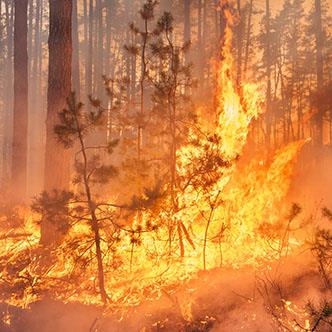
Wildfires are hazardous to heart health, based on a study that links the 2015 California wildfires to an increase in heart-related hospital visits, particularly in the elderly.
Published in the Journal of the American Heart Association, this is the largest study of its kind to explore the cardiovascular impact of wildfire smoke exposure. It included nearly 1.2 million emergency room visits that occurred during the 2015 wildfire season in California.
The study was a joint collaboration between researchers at the University of California, San Francisco, the California Department of Public Health and the EPA, in an effort to better understand the health effects of wildfires.
Wildfire season in the U.S. has increased in both intensity and duration in recent decades and experts worry about the potential health consequences. According to authors, wildfire smoke contains numerous air pollutants, which have been linked to both respiratory and cardiovascular issues. While the respiratory risks have been well documented, the cardiovascular effects of wildfire exposure are less understood.
To learn more, researchers analyzed all hospital visits between May and September 2015 across most of California. The analysis covered 8 of the 15 California air basins, which are used to divide the state into smaller regions to assess air pollution. Researchers then looked back at national records to estimate daily smoke exposure in each region and compare with the frequency of hospital visits.
After analysis, researchers found that wildfire smoke significantly increased hospital visits for numerous heart conditions, such as heart disease, heart failure, heart attack and stroke. Risk was highest in older adults aged 65 or greater and increased with smoke severity. For example, periods of dense smoke were more strongly associated with heart-related visits than periods of light or medium smoke. The longer smoke remained in an area (known as a smoke lag), the greater the cardiovascular effects.
Authors say that these findings highlight the need to both prevent and address increases in cardiovascular risk during wildfire season.
Most importantly, during active wildfires individuals in nearby areas should be encouraged to evacuate or move to clean air shelters. These precautions are especially important for older adults or individuals with existing heart conditions, who may be more susceptible to the effects of smoke.
Those in affected areas should also be advised to limit outdoor activity and consider wearing masks or using indoor air filtration. These strategies have been shown to help minimize exposure to dangerous air pollution from wildfires and may help prevent increased heart risks.
Additionally, authors note that hospitals should be made aware of potential surges in visits during wildfire season and plan accordingly. Heart events like heart attack and stroke require immediate treatment and it’s important that hospitals are well-equipped to deal with an uptick in visits during these periods.